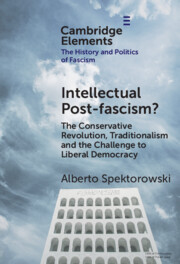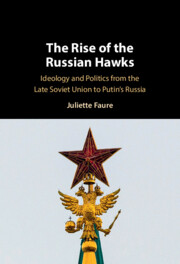Refine search
Actions for selected content:
153 results
2 - Pan-Russian World and Ukraine
- from Part I - Imperialism and Nationalism
-
- Book:
- Russia's War on Ukraine
- Published online:
- 20 November 2025
- Print publication:
- 04 December 2025, pp 57-90
-
- Chapter
- Export citation
8 - Conflicts over Reproductive Rights since the 1980s
-
- Book:
- Population Control as a Human Right
- Published online:
- 09 October 2025
- Print publication:
- 23 October 2025, pp 158-183
-
- Chapter
- Export citation
Too Woke or Not Woke Enough? Racial Awareness in the Church of England
-
- Journal:
- Journal of Anglican Studies , First View
- Published online by Cambridge University Press:
- 20 October 2025, pp. 1-23
-
- Article
-
- You have access
- Open access
- HTML
- Export citation
Chapter 1 - Hegel and Liberalism
- from Part I - Hegel, Freedom and Liberalism
-
- Book:
- Hegel Beyond Liberalism
- Published online:
- 27 September 2025
- Print publication:
- 16 October 2025, pp 13-36
-
- Chapter
- Export citation
Introduction
-
- Book:
- Hegel Beyond Liberalism
- Published online:
- 27 September 2025
- Print publication:
- 16 October 2025, pp 1-10
-
- Chapter
- Export citation
Downfall Voyeurism: Jazz Dancing and the Making of Moral Concern in America
-
- Journal:
- The Journal of the Gilded Age and Progressive Era / Volume 24 / Issue 4 / October 2025
- Published online by Cambridge University Press:
- 27 October 2025, pp. 390-408
- Print publication:
- October 2025
-
- Article
-
- You have access
- Open access
- HTML
- Export citation
Chapter 33 - Race and Empire
- from Part V - Afterlives and Future Fields
-
-
- Book:
- Michael Field in Context
- Published online:
- 03 October 2025
- Print publication:
- 25 September 2025, pp 315-323
-
- Chapter
- Export citation

Intellectual Post-fascism?
- The Conservative Revolution, Traditionalism and the Challenge to Liberal Democracy
-
- Published online:
- 23 June 2025
- Print publication:
- 10 July 2025
-
- Element
- Export citation

The Rise of the Russian Hawks
- Ideology and Politics from the Late Soviet Union to Putin's Russia
-
- Published online:
- 11 June 2025
- Print publication:
- 29 May 2025
1 - Introduction
-
- Book:
- The Rise of the Russian Hawks
- Published online:
- 11 June 2025
- Print publication:
- 29 May 2025, pp 1-27
-
- Chapter
-
- You have access
- HTML
- Export citation
4 - From Fringe to Mainstream
-
- Book:
- The Rise of the Russian Hawks
- Published online:
- 11 June 2025
- Print publication:
- 29 May 2025, pp 96-126
-
- Chapter
- Export citation
9 - Conclusion
-
- Book:
- The Rise of the Russian Hawks
- Published online:
- 11 June 2025
- Print publication:
- 29 May 2025, pp 291-299
-
- Chapter
- Export citation
A Party that Went Viral? The Drivers of Support for the Parti Conservateur du Québec in the 2022 Election
-
- Journal:
- Canadian Journal of Political Science/Revue canadienne de science politique / Volume 58 / Issue 2 / June 2025
- Published online by Cambridge University Press:
- 28 April 2025, pp. 277-296
-
- Article
-
- You have access
- Open access
- HTML
- Export citation
Chapter 14 - Modeling Long-term Trends and Discontinuities in Art
- from Part III - Understanding Art Through Dynamic Models
-
- Book:
- A Complex Systems View on the Visual Arts
- Published online:
- 20 March 2025
- Print publication:
- 03 April 2025, pp 362-381
-
- Chapter
- Export citation
Rage Against the Machine? Why System Justification Drives (Some) Asian Americans to Spurn Racial Solidarity
-
- Journal:
- Journal of Race, Ethnicity and Politics / Volume 10 / Issue 3 / November 2025
- Published online by Cambridge University Press:
- 03 April 2025, pp. 697-718
-
- Article
-
- You have access
- Open access
- HTML
- Export citation
Explanationist Seeking Agreement with Bergmann
-
- Journal:
- Canadian Journal of Philosophy , FirstView
- Published online by Cambridge University Press:
- 24 March 2025, pp. 1-8
-
- Article
- Export citation
Chapter 3 - Archinus or the Victory of the ‘Moderates’
-
- Book:
- Athens, 403 BC
- Published online:
- 28 February 2025
- Print publication:
- 20 March 2025, pp 96-137
-
- Chapter
- Export citation
Good news and bad news are still news: experimental evidence on belief updating
-
- Journal:
- Experimental Economics / Volume 22 / Issue 2 / 15 June 2019
- Published online by Cambridge University Press:
- 14 March 2025, pp. 369-395
-
- Article
- Export citation
Chapter 2 - Conservatism: Tradition, Hierarchy, and Fictions of Social Change
- from Part I - Concepts
-
-
- Book:
- The Cambridge Companion to Nineteenth-Century American Literature and Politics
- Published online:
- 06 March 2025
- Print publication:
- 13 March 2025, pp 35-50
-
- Chapter
- Export citation
4 - Post-miracle
-
- Book:
- Why the Ancient Greeks Matter
- Published online:
- 06 February 2025
- Print publication:
- 06 February 2025, pp 151-170
-
- Chapter
- Export citation
